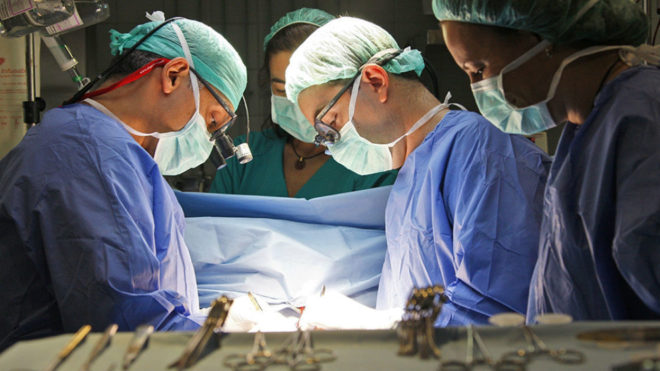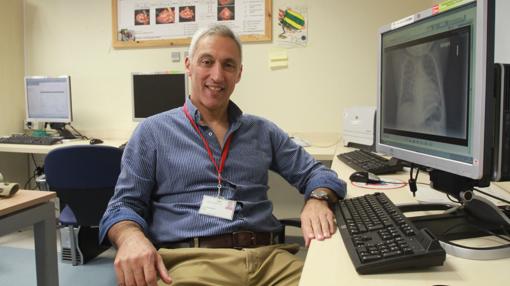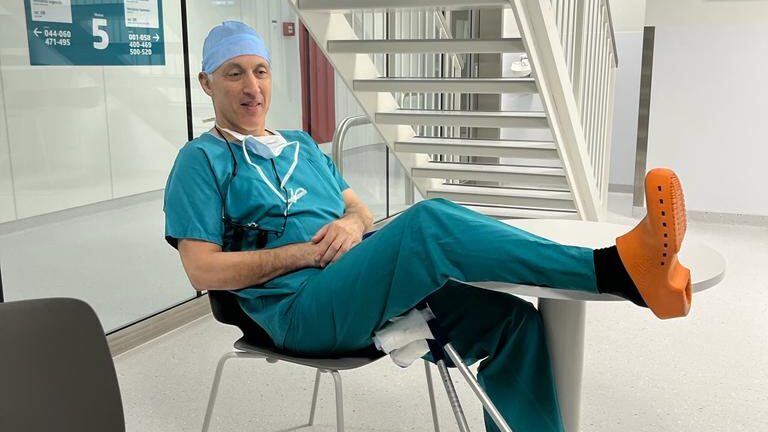- 0041 76 2050 764
- nika@mentalgamepro.com
- Lausanne, Switzerland
A dear person once said to me that we are all everyday athletes. Thus, we can all benefit from mastering our mental game.
Still underdeveloped in Europe compared to the USA, applied sports psychology or mental game training is a set of tools and strategies that professional mental game coaches use to help athletes overcome mental challenges such as distractions, loss of self-confidence, low self-esteem, and fear of failure. It’s a tool for developing mental toughness, aimed at athletes and military, special ops, surgeons, and other top performers.
Prof. Reza Hosseinpour, who performed over 4000 heart surgeries and transplanted more than 200 hearts, discusses mental toughness and how we can achieve peak performance!
Prof. Hosseinpour, let’s kick things off with a glimpse into your journey as a cardiac surgeon.
Absolutely! My medical odyssey began in England, where I finished medical school. I continued my medical training, predominantly in the UK, with a few detours to the United States and France. Upon completing my training, an opportunity emerged from Seville in Spain. The University Hospital of Seville beckoned me to lead their pediatric cardiac surgery unit, where I dedicated 16 years of my life. Amidst this journey, I did a sabbatical year in Switzerland, in the picturesque city of Lausanne. When the pediatric cardiac surgeon in Lausanne was ready to pass the torch, they reached out to me. Now, for the past 10 months, I have been working at the Cardiac Surgery Unit of the University Hospital in Lausanne.
How many years of professional experience as a cardiac surgeon do you have?
As a cardiac surgeon since 1994, but initially, it was pure adult cardiac surgery. I entered pediatric cardiac surgery in 2001. So that was 22 years ago.
Let’s delve into the mental game of cardiac surgeons and its similarities to top performers like athletes. How would you define mental toughness in cardiac surgery and medicine?
Well, as we spoke before this interview, there is no one definition for it. People generally invent their own explanations. It’s a coping mechanism. How you deal with stressful circumstances, work stress, and we are all different there. I could tell you how I do it, but that may be my way, and no other person may be doing it.
And interestingly, you should mention sports because I’ve learned what I do essentially from watching sports. Athletes have been a source of inspiration with how to cope with adversity, and I apply it in the way that I see fit, you know? I don’t cross-check. I know how I cope.

Now I am curious; please give us more detail on how you deal with it (A/N with adversity & stress).
Essentially, demystify it and break it down into manageable components.
Interesting. We will get back to your technique later. Several attempts in the past decades have been made to introduce mental skills training in the medical curriculum for surgical trainees. Unfortunately, after the initial trial period, none of the programs lived. Why do you think the attempts failed?
You know, I can see precisely why it failed. I lived through one such thing while training in Cambridge in the UK. They tried to do that, and it didn’t work. I didn’t know why it didn’t work then, but now I think back and see why. It is because they had one formula for everybody. Everyone copes with stress differently; just as I said, They came in and had already profiled the established cardiac surgeons and had assumed that the traits that those surgeons possessed were the desired ones. So, they were trying to devise a teaching system to install those traits into all trainees. I had problems with that because I didn’t look up to or want to become like any of those people.
And I said so at the test. They thought that was outrageous of me to say, so I rated very low on that test. I became material for being chucked out. The problem was that there were other tests for manual ability and dexterity, and I got the highest mark there. So I was called in by my boss, who said: ‘’You don’t have the personality to be a cardiac surgeon, but your hands work better than all the others. What are we going to do with you?’’ They decided to keep me. But I said, with all due respect, I don’t look up to become like you guys.
You guys are not good role models. Too big a deal is made of our work as though we need to be someone special to do it. And that in itself is a bad thing. It puts people on the defensive. People enter cardiac surgery, wondering whether they have what it takes to be a cardiac surgeon. But honestly, it doesn’t take much more than interest. If you’re interested in it, you train in it and eventually become good at it. But the atmosphere generated around it makes you think that you have to be someone really special to do this work, and that, in my opinion, is false, and you start on the wrong foot. I don’t consider myself anyone exceptional. I consider myself a man of average intelligence and average ability, but I’ve become a very good cardiac surgeon. Why? Because I was interested in it and trained at it. And it’s not that difficult, despite popular belief. This was the problem; they were trying to impose a fake image. And they were trying to set the same MO for everybody.
This reminded me of a book I read about Navy seals, where a Navy SEAL officer said people think Navy seals are men of unique capabilities, but actually, they’re not. They’re just average men who decided to work on their physical toughness relentlessly. So the readers of this interview will appreciate this demystification of the surgical profession. Why do you think surgeons and doctors have always had this ‘’god-like” status in society?
I think it’s history; it’s dying out now. People do not look up to doctors like they used to, but if you go back in time, over the centuries, being a doctor carried a very high social status, and it was the art of healing people. It was highly regarded, and the people that did it were extremely valued. The doctor comes from the word docere, which means teaching, and it was an apprenticeship system whereby you couldn’t be a doctor and not teach because you would need a helper with you. So doctor means teacher, and doctoral degrees, called a Ph.D., first started in France at the University of Paris, maybe around 1150. The first subject they taught was philosophy, and the degree is called Doctor of Philosophy. But philosophy in those days did not mean the same thing as it means today. Philosophy in those days involved anything that included thinking. The Faculty of Philosophy included theology, for example.

So right from the beginning, doctors had this amazingly high status in the eyes of the public and academia. It’s still in society today. You say you’re a doctor; it carries weight. It doesn’t have the same weight as it did in the 12th. century, but still. Unfortunately, some people choose to become doctors just because of that status. Now, some specialties within medicine receive a higher rate than others, like the heart specialist. Emotionally people have associated the heart with the site of the soul and the site of love and romance, which is all nonsense. The heart is a muscle. It’s a pump. All it does is receive blood and pump blood. That’s all there is to it. But it has been associated with such things that someone who heals hearts becomes important in the public’s eyes. So that’s one of the things that gives you status. The other thing that provides status to the public is that heart surgery creates a lot of cash flow. And that generates publicity, and publicity gives you fame, and fame gives you social status. The whole thing becomes self-feeding.
As a cardiac surgeon with extensive experience, you undoubtedly faced challenging moments where mental toughness and resilience needed to be demonstrated.
Yes, I remember one situation vividly. For the first time, I was doing a very complex operation in Seville, and it was a child that no one else had dared to touch; this operation had never been done in Spain and many other parts of the world, either. There, I knew that many people were watching me with critical eyes. That was highly stressful, so stressful it gave me a fever. But I put on a facade, kept it to myself, and went ahead and did the operation.
Let’s talk about visualization and mental rehearsal. It’s been proven to stimulate the same brain regions as a physical practice and thus help improve real-life performance in athletes. Do you use it before complex cases?
Very much so, it is an essential tool, and we’ve learned that from sports people. One of my old masters used to say that you have to learn how to do a particular operation perfectly along with all the things that can go wrong and that you must do before the operation as part of your homework. Visualization before the real-life case helps you perfect your technique so that you don’t think of the details when the moment comes to operate. You operate from motor memory; the body knows what to do and where to go. Like sports, once that gun comes off and the race begins, you just run; you don’t overthink.
What about resilience? Whether in sports, medicine, or daily life, we still do not know what makes some of us more resilient than others. Has a challenging profession like yours primed you to more of a resilient approach to life?
I don’t think you go and become a cardiac surgeon because you’re resilient. It’s more the other way around. You become resilient because you’re a cardiac surgeon, and you learn to cope with stress. Sure, there are people with more talent and resilience than others. But talent is overrated. A lot of it is just continuous practice and exposure. The more exposure you have to stressful situations, the more you learn to cope. It is not that simple; of course, you must actively seek to ”turn on” the coping mechanism instead of the ”victimhood” mechanism.

Athletes, special operators, and cardiac surgeons certainly face more moments that challenge them to push beyond physical and mental limits. How about moments of self-doubt? How do you manage them?
Moments of doubt are not rare. They are prevalent. They happen all the time. So it would be best to have a mechanism to deal with it. I always have the anatomic objective in mind and do whatever it takes to get there. And yes, that doesn’t always work because you often start doubting and self-sabotaging yourself. But you see, even the most complex of operations consists of a combination of very simple techniques, which individually are all doable. So, when doubt arises, I break down what I’m about to do into components, each of which I can do from ‘’motor memory’’ without thinking. For example, the first component is opening the chest. Well, I can open the chest. It’s not a challenge. The next component is putting the patient on bypass. I can put any patient on bypass; not a challenge. So you literally live in the moment.
You break it down to the level you can do without thinking about it, again, doing it from ‘’motor memory’’ without overthinking.
Another essential skill for top performance is knowing how to manage distractions. This is becoming harder and harder in today’s world of social media. How do you maintain your focus?
Well, first of all, you need to know yourself; you need to know what works for you and what doesn’t. For example, some surgeons like to have music in the background. I’m not like that. I do not allow music in my operating theater because I like music too much, so it becomes my focus. I cannot operate with music on.

Thank you for demystifying that because we always think of Grey’s Anatomy and all the surgeons operating with Guns N’Roses playing in the background.
It may apply to some individuals, but we are all different. Some surgeons like classical music when operating. Some like to have the news in the background, which blows me away. You need to know what works for you and what doesn’t. For me, a quiet atmosphere works very well. I don’t like people whispering. Because people whisper not to disturb you, they don’t realize they are doing quite the opposite by whispering.
What about those things you cannot ignore easily? Like a noisy crowd for a tennis player.
Yeah, surgeons have their ‘’noisy crowd’’ equivalents for sure. We go back to the issue of components. The most challenging situation becomes manageable the smaller you make your components. For instance, sometimes, when you’re doing a very complex case that is an emergency, and you cannot avoid the commotion in the (operating) room. You can’t tell other people to be quiet either because they’re doing their jobs. So you take your operation components, make them smaller, and force your mind to be occupied with these short periods of concentration.
I’m sure now, with experience, it becomes more manageable, but when you were younger, did it ever happen to get distracted at a crucial moment?
Surgical training is such that they don’t allow you to be in that position. So you operate under supervision when you’re very young, so your boss is in front of you, lets you operate, and controls the operation.
You get the false impression that it’s you doing the operation, but the operation’s control is in your superior’s hands. So you are protected initially until you learn how to fly independently.
How do you ensure unwavering focus in the face of significant life challenges outside the operating room? How do you focus on the patient, knowing you must address a pressing personal matter as soon as you remove the scrubs?
Again, I go back to the components of the operation. Just break them down. The more stressed you are, the smaller you make the components; the smaller they are, the more manageable it is.
The smaller there they are, the easier it is for you to concentrate.
Yes, you break it down to a level of components you can manage easily. Given the circumstances, you’re in.
And that keeps you focused.
Yeah, because each part of the focus is short and intense. Permits you to get into the ‘’zone.”
Fantastic that you mentioned the zone. Some sports psychologists actually question the concept of the zone for a prolonged period of time. They say it is unsustainable.
I agree. I have been in the zone, and it doesn’t last long. It’s short bursts. And while you’re in it, you love it. But it’s elusive, and when it’s gone, you’re hoping it comes back. But it’s only minutes each time.
In sports, it is said that 80% of the game is mental, whereas 20% only is physical. How about surgery?
It’s difficult to put percentages on these things, but there is no doubt that the mind plays a huge part in it. Now is it 80% mind, 20% technique? I don’t know, but it’s a huge chunk of it. One of the big differences between a great surgeon and an average surgeon is not in their hands. It’s in their minds. How difficult is it to execute the moves during surgery? I always tell people that you can operate if you can write. Look at all the angles of each letter. Look at the sharp angles, the round curves, the dots, the crosses. It’s highly sophisticated. More sophisticated than the finest of surgeries. So if you can write well, it’s legible, you can operate. That’s not what differentiates a great surgeon. The great surgeon has mental strength. It’s like tennis if you look at it. I’m throwing figures into the air now, ok? The top 1000 tennis players in the world can hit the ball equally well in terms of forehand, backhand, and smash. You need to know who the person that performed a forehand was to tell the difference between seed one and seed 1000. The difference is the seed one. He can come onto the pitch and be match point down. If he loses that point, he’s lost the match. And then he comes on and serves an ace. That’s the difference. The seed 1000 couldn’t do. You know they would crumble.
Getting over mistakes quickly is challenging for all top performers. How do you come back after a bad case or a mistake?
You know, I learned that from tennis too. Tennis players play, hitting one ball at a time. They play a ball badly, and it doesn’t affect their next play, the Champions, the true champions. They play each ball as though it is a game in itself. It’s their component. They’ve broken down the match into individual components, and each component is a ball. So maybe you just wrecked one point, but the next point, you play it fresh.
So you don’t let mistakes get to you and harm your confidence?
Correct, I may get slightly sad, but I don’t doubt I’ll do better next time.
© 2024 Mental game Coach. All rights reserved
Chat with Nika Today